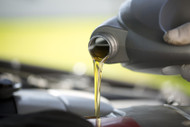What Happens If My Car Runs Out of Engine Oil?
12th Nov 2018

Motor Oil Basics
Most cars hold 5 to 8 quarts of engine oil. Also known as motor oil, it plays a vital role in protecting automotive engines from damage. It lubricates the engine's moving parts, removes contaminants, and reduces heat, all of which are essential to making an engine last. If your car is leaking engine oil, though, you might be wondering what happens if it runs dry.
Oil Pressure Light
One of the first things you may notice if your car is low on engine oil is an illuminated "oil pressure" light on the dashboard. The onboard computer is designed to measure oil pressure to ensure that it's an appropriate amount. Depending on the specific type of engine, it may have about 10 pounds per square inch (PSI) of pressure for every 1,000 resolutions per minute (RPM). Lack of oil, however, can prevent the engine from achieving this amount of oil pressure, in which case the "oil pressure" light will turn on.
Overheating
You may also discover your car's engine overheating if it's out of oil. Some drivers assume that a healthy automotive cooling system will protect their car's engine from overheating. While the cooling system -- radiator, radiator cap, hoses, thermostat and heater core -- are essential to protecting against overheating, low or no engine oil can also cause engine temperatures to increase. According to Military.com, up to 80% of "waste heat" generated by automotive engines is removed by the oil. Without oil, or with an insufficient amount of oil, this waste heat will accumulate while simultaneously increasing the engine's temperature.
Bearing Damage
Bearings are the moving parts of an engine that support its crankcase. During combustion, these bearings move to produce the energy that powers the car. Normally, oil is pumped to the bearings where it lubricates and protects them from damage. Loss of oil, however, will result in the bearings rubbing directly against each other, which can quickly cause them to fail and the engine to seize. When this happens, you may hear a distinct "knocking" sound, or your car may fail to turn on at all.
Protect Your Engine From Damage
To protect your car's engine from potentially catastrophic damage, you must ensure there's adequate oil present at all times. At least once a week, pull the dipstick to inspect your car's oil levels. The dipstick should read somewhere in the middle, indicating that there's an appropriate amount of oil present to keep the engine running healthy.



